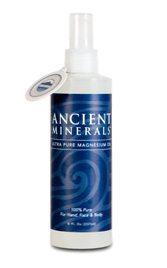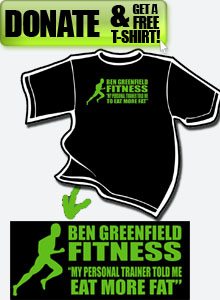August 12, 2009
Click here for the full written transcript of this podcast episode
You'll notice above that at the top right of this post, you have access to a “Podtrac Player” which will allow you to open the podcast and listen in a pop-up player while you move on to surf the internet. You can also simply click here to go to our iTunes page and subscribe to have your computer automatically download episodes as they are released. Finally, to help make our show even better, take just 5 minutes to complete the quick survey below:
—————————————————————–
In this August 12, 2009 free audio episode, I answer listener Q&A's on “Why Exercise Won't Make You Thin“, a recent Time article by John Cloud, how to get rid of the extra little bit of flab in the mid-section, whether testing really improves performance, running during your period, more on magnesium, the formation of a local Spokane/Coeur D' Alene area HCG diet fat loss group.
Listener Q&A:
Listener Scott asks: “I train really hard, and have a pretty clean, healthy diet (my eating disorder issues aside.) Yet I still have a layer of like “flab” at the bottom of stomach–like the skin is not taught at all. I had my body fat tested a few weeks ago and I am still at about 3-4% and have been as low as 1-2% in the past so why is this fat or skin still there? Do you have any suggestions to get rid of it or am I just being vain? I'd appreciate the feedback.”
Listener Al asks me to comment of the following post taken from the website of Paulo Sousa, a European triathlon coach: “When there is some sort of test that improves performance, I will do it. Most of those tests only serve to either be another service that you can charge athletes, or a way of justifying pseudo-scientific work and/or jobs. If I thought lactate tests were helpful, I would do them myself. I STOPPED doing lactate tests back in 2003. VO2max tests are interesting, but with little value to the training process. Not to mention that there is research that found no correlation between lactate test results and performance. What happens is that everyone is SO happy to do that kind of testing, they feel good about the pseudo-scientific side that adds to training. My personal favorite is doing tests at the beginning of the season, so when you repeat the tests a few weeks later, there is so much improvement, you feel so good about yourself! So it's not that I am old-school, or ignorant about these matters, it's just that when it comes to training I am only interested in performance.”
Listener Lindsey asks: “I'm currently training for a marathon and I try to stick to a pretty healthy and efficient diet for my training. But my question is, how do you suggest I combat my monthly woman issues, without binge eating and feeling like absolute crap all the time. Also do you know of some good SI joint stretches. I happen to have been diagnosed with sacroillitis due to two car accidents and being a former college soccer player turned endurance athlete. I listened to your podcast regarding strengthening the glutes , but some days I am in a heck of a lot of pain.”
I mention the following two supplements in my response:
EnerEssence I Ingredients
Mixed Carotenoids, Vitamin C (Calcium Ascorbate), Vitamin D-3 (Cholecalciferol), Vitamin E (d-alpha Tocopheryl Succinate), Vitamin B-1 (Thiamine HCL) Vitamin B-2 (Riboflavin), Vitamin B-6 (Pyridoxine HCL), Folic Acid Vitamin B-12 (Cyanocobalamin), Biotin, Calcium (Citrate), Iodine (Kelp), Magnesium (Aspartate and Citrate), Zinc (Picolinate), Selenium (Selenomethionine), Copper (Aspartate), Manganese (Citrate), Chromium (Picolinate), Potassium (Citrate), Choline, Inositol, Vitamin B-5 (Calcium Pantothenate), Vitamin B-3 (Inositol Hexaniacinate), Bioflavinoids (Citrus), Rutin, Hesperidin, Boron (Citrate), Silica, Soy Isoflavones, Custom Herbal Blend: Red Raspberry leaf, Nettles leaf, Cranberry, Lactobacillus Acidophilus
EnerEssence I provides you with optimum nutrition. It assists your body in maintaining normal menstrual cycles and promotes a healthy reproductive system. It sets the stage for the future health of your immune, skeletal and cardiovascular systems. Click here to learn more or to purchase.
 PMS Relief Formula Ingredients:
PMS Relief Formula Ingredients:
Vitamin E (d-alpha Tocopheryl Succinate), Vitamin B-6 (Pyridoxine HCL), Magnesium (Amino Acid Chelate), Chromium (Polynicotinate), Evening Primrose Oil, Custom Herbal Blend: Wild Yam (root), St. John's Wort (standardized to .3% Hypericin), Vitex (standardized extract .75% Aucubin), Ginkgo (standardized to 24% Flavone Glycosides).
PMS Relief Formula assists your body in reducing PMS symptoms such as anxiety, depression, fluid retention, bloating, breast tenderness and food craving. Click here to learn more or to purchase.
Finally, Listener Eric says: “Ben…I want to thank you for the Magnesium info. A while back I purchased the Ancient Minerals magnesium bath flakes and started using them on semi-weekly basis…and the evening before a race. As you know, in between races (and once during) I started having muscle spasms and cramps, and even started having spasms wake me up at night. About two weeks ago, I started taking a magnesium supplement (magnesium gluconate) since taking a magnesium bath every 3 days or so would be too expensive. I sweat ‘profusely' when I work out…and after listening to the podcast and some reading last night, the light bulb went off. Even though I use Infinit, and take the baths, I was probably not replacing magnesium as quickly as I was depleting it…which I realized last night was probably the culprit to another issue I developed some time this spring – when the temps started to climb – asthma like symptoms – especially when I swam. I was getting that ‘hypoxic feeling' way to easily when I was swimming in combination with shortness of breath – more than earlier in the training season. In an open water workout this past Tuesday – somewhat rigorous – I noticed I was NOT getting that ‘hypoxic feeling' in my chest that I grew to expect. I believe I credit that, and the lack of muscle cramping, to my increased supplementation of magnesium. So – thank you Ben!”
If you find this information intriguing, and you as a coach, athlete or weekend warrior want to learn even more about the topic, Dr. Mark Sircus's impressive book “Transdermal Magnesium Therapy” is available by clicking here. In the meantime, I am personally introducing this unbelievable sports performance compound to the training and racing protocols of myself and the athletes that I coach, as well as the individuals who I consult for fat loss and energy. We are using a simple spray-on application for the fore-arms, prior to exercise. I have found a reliable source to be Magnetic Clay Ancient Minerals Ultra Pure Magnesium Oil. I also mention to Eric in my response that “magnesium gluconate” is a bit out-dated and not really the best source. Magnesium chloride, the source in the oil above, is better absorbed, and you can actually spray 10-15 times 1-2x per day directly into the lungs.
————————————————–
That’s all for this week. Coming soon in future podcasts: Weight Loss & Hypnosis, The Paleo Diet for Athletes, Swim Super Special Be sure to leave our podcast a rating in iTunes – just click here to go to our iTunes page and leave feedback! Finally, remember all the time put into producing this podcast for you, and consider donating to our show (we’ll throw in a free T-shirt)!
——————————————————–





Ben,
Thanks so much for answering my questions and for the in depth answers. I’m going to take your advice and look to increase my body fat percentage. I would like to try eliminating the processed sugars from my diet, but I’m not sure where they might be coming in. What foods that I think are healthy and am likely to be eating may contain these? Thanks again!
I think the Time article is completely ridiculous! We all exercise for different reasons… to lose weight, to attain a goal, to help cope with stress, etc and these are all healthy, realistic reasons to exercise. But to exercise in ORDER to eat sugary food?? I just finished my first triathlon and am training for a marathon and when I’m in the game, going strong, having the focus I need to get me through a long run, the LAST thing it makes me want to do is choke down ice cream and cheeseburgers and muffins. When I finish a long run I feel more aware of the types of foods I need to eat in order to replace the fuel I have burned. Sure maybe here and there I will “reward” myself with croissant or mocha, but overall, I workout for my HEALTH and because it makes me feel amazing and I can SEE results in myself and my confidence and my outlook on life. Too many people look at exercise as a way to gain permission to eat poorly so duh, of course they aren’t going to lose weight. I think all they need to do is change their outlook. You can’t expect to see results when your hunched over a stair climber supporting your weight on your elbows while you page through a magazine for 20 minutes. There is a mental aspect. Get your mind involved! Don’t just go through the motions! Exercising for the right reasons will soon teach you to care about how you are treating your body nutritionally. Another thought I had about this article was the fact that the author basically said he/she had been going through the SAME hellish exercises for years. Switch it up then! Do something you enjoy! There are so many options!
I had an experience training for a half that made me understand where the author was coming from. The training group I was with emphasized carbs and I gave myself permission to eat more carbs and the wrong kind after a long run. I thought I would loose weight (I was about 23% bf age 44) but never lost the fat around the middle and may have even gained fat. After learning about what weight trainers eat and looking more deeply into nutrition, I have found out that exercise indeed will not make you thin if you are eating unhealthy foods. I disagreed with the overall message of the article, however, and like Jerry, fear how people, especially parents, will interpret his message. Ben’s comments on the article are very interesting.
I fear that the take-away message from the section of the Time magazine article regarding children will serve to discourage an already underactive group to become even less active.
The basic premise of the article is true: calories in vs calories out = weight lost/gained, but I don’t think that most people will be well served by the overall tone of the article. I remember well a friend of mine who spent thousands of dollars in the ’80’s to participate in an inpatient program that taught her how to be comfortable with her obesity.
I find that doing a standard aerobic test set helps whether it’s a swim, run, or bike set. Just something that you can do every few weeks that will test if you are getting faster or not!
Isn’t 1-2% body fat a unhealthy. Besides dehydration isn’t that why you hear of bodybuilders dropping over dead?
I read this article on the plane today flying into Seattle. I fully agree with the article…IF YOU EAT MUFFINS AFTER WORKOUTS. Can’t wait to listen to podcast 55 and see what your take on the article is.